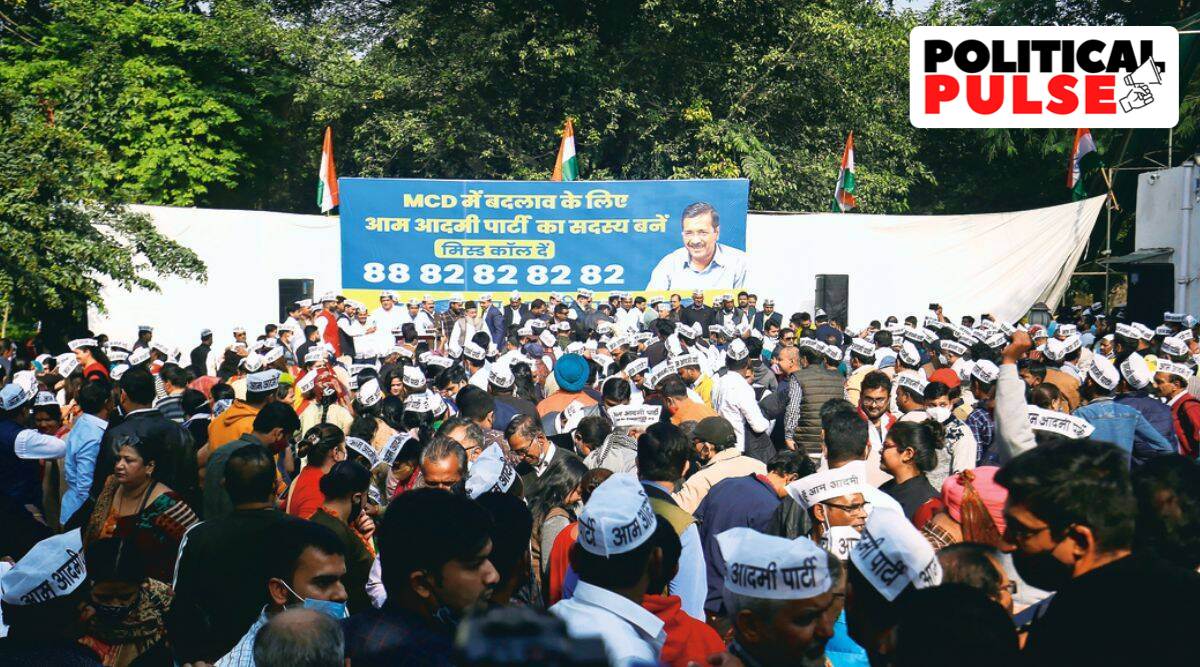 AAP holding its ‘MCD Badlaav’ campaign. (Express)
AAP holding its ‘MCD Badlaav’ campaign. (Express) The year was 2016 and the BJP was facing anti-incumbency after nine years of running all the three municipal corporations of Delhi. The BJP played its first card in November by appointing first-time MP and Bhojpuri singer Manoj Tiwari as state president – a move till then unthinkable in Delhi BJP politics that was dominated by Punjabi and Bania leaders. The target were the Purvanchali voters of Delhi, comprising over 30% of the total number.
When the Uttar Pradesh elections in March 2017 were swept by the BJP, the party wielded its second card – bringing in UP stalwarts. Chief Minister Yogi Adityanath also campaigned for a day, with BJP candidates vying for him to turn up for them.
On the other side, the challenger Aam Aadmi Party went into the MCD elections in the bitter-sweet aftermath of the Punjab election results. AAP had made a stunning debut with a second-place finish behind the Congress, but the fledgling party’s dispirited volunteers had struggled to rebuild a momentum in Delhi.
In the third card, the BJP had changed all its candidates, in a bid to blunt anti-incumbency.
With Prime Minister Narendra Modi at his peak popularity, all the factors had come together to give the BJP 181 of the 270 wards, and an absolute majority in each of the corporations. AAP had come a distant second, with 48 seats, and the Congress 30.
Five years later, the MCD polls stand at the same juncture – though a late-minute reunification bid has made their timing uncertain – with a difference: the momentum is now seen as with AAP, after its landslide victory in Punjab. While the BJP too has made history by retaining power in both Uttar Pradesh and Uttarakhand, AAP has got a second wind in the Capital with another state under its wing.
A senior AAP leader said: “The golden rule of politics is that you cannot use the same trick twice, whether it is slogans or election narrative. The BJP tried to portray us as pro-Khalistani in both 2017 and 2022, but people did not buy it the second time… Similarly, the BJP changed all the candidates last time to portray that it was serious about corruption. But the new councillors proved worse, and the overall situation is the same as in 2017.”
The reason the Assembly polls in neighbouring states are watched so closely in the context of local Delhi elections is the migrant population in the Capital with its deep connections back home. If Purvanchalis (from UP and Bihar) are the largest block, the Punjabis (including Sikhs) comprising around 15% of the voters are the second biggest. In at least 20 constituencies of Delhi, their share is between 15%-20% of voters.
“The difference is that the BJP may have retained but AAP has gained,” a senior BJP leader admitted, adding that this time the party may lose a section of both its loyal Bania and Punjabi voters. (The BJP estimates that more than 11% of its committed voters in Delhi are Punjabis.)
“After the rise of Arvind Kejriwal, who comes from the Bania community, a large chunk has drifted to AAP,” the leader said, adding that among Punjabis, both the recent Punjab elections and the BJP’s split with Akalis will have an impact.
“Many of them have relatives in Delhi and if they share a positive image of the government in Punjab, combined with the anti-incumbency the BJP is facing for MCD corruption, a large number of people from this section will switch loyalties,” an AAP leader said.
Apart from the BJP’s split with its oldest ally the Akali Dal, the Sikh vote may be driven by the rancour in the community towards the Centre over the long farm protests. The community is believed to make up around 4% of the voters. In the 2017 corporation elections where the BJP and Akalis had fought together, the BJP had won 179 seats and the Akalis five.
However, even last time, after AAP’s strong debut in Punjab, Sikh voters had shown a swing towards it. The party had won all the wards where Sikhs are in large numbers, like Hari Nagar, Rajouri Garden, Punjabi Bagh, Tilak Nagar, Rajender Nagar.
The BJP has been reaching out to the Sikhs. The most popular local Akali leader and former Delhi Sikh Gurdwara Parbandhak Committee president Manjinder Sirsa recently joined the BJP. Other Sikh leaders too have been inducted.
Earlier, after the Akalis had left the NDA in protest against the Centre’s new farm laws, most of its councillors had switched to the BJP, including GTB Nagar Councillor and Mayor Raja Iqbal Singh.
- The Indian Express website has been rated GREEN for its credibility and trustworthiness by Newsguard, a global service that rates news sources for their journalistic standards.

